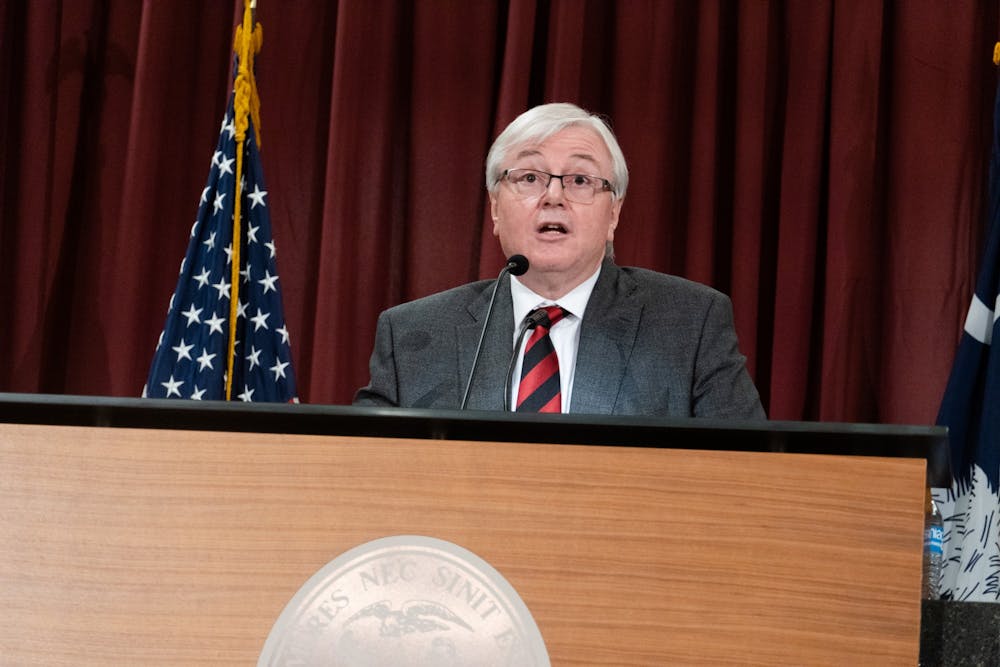Michael Amiridis began his term as the 30th president of the University of South Carolina on July 1, aiming to better the university and state by emphasizing student education and contributing to economic developments.
Amiridis was elected president by the board of trustees on Jan. 14 after a forum with the USC community. He comes from the University of Illinois Chicago (UIC) where he was the chancellor since 2015. Before that, he spent more than two decades at USC, serving six of those years as the university’s provost under former President Harris Pastides, whose last day as interim president was June 30.
Ahead of his departure, Pastides said he's optimistic about USC's future under Amiridis' leadership. The new president's main goal is to advance the university as a leader in South Carolina.
“We need right now is to move forward with the university — make a strong statement to the state that we are here. We are building the future of this state,” Amiridis said. “We're educating the next generation of leaders.”
The new president said he hopes to solidify USC's place as a top university by improving the impact of research programs, saying he plans to prioritize research, user-friendly initiatives and positive student experiences.
UIC serves as a leader in healthcare education and Amirdis said he hopes he can bring some of the lessons he learned as chancellor to facilitate USC’s growing healthcare enterprise and create more opportunities for students.
“It's an urban institution in the center of a global city, which gives a lot of opportunities for students, for internships, for working with industry, and that's something that I want to take,” Amiridis said. “We cannot duplicate it here, but we can duplicate the connections here. So our students have the same opportunities to work in the corporate environment, nonprofit organizations and so on.”
As one of the top schools in the nation for first-year experience, Amiridis said he plans to refocus USC’s initiatives to support student involvement and success.
“This university has a great history in terms of the first-year experience and the student experience. Everybody across the country knows about it, but that was 50 years ago,” Amiridis said. “Now, after a pandemic, with shifting demographics across the country and a different environment that we're facing, I think it's time to look at what is next.”
As one of his first large projects, Amiridis plans to organize a student summit in September where hundreds of USC students will meet for a facilitated discussion on their wants for the university. Deans and administrators will be allowed to attend with one expectation: “You don’t talk.”
“I'm actually tired of listening to 60-year-olds with white hair pontificating about what the students want. In my experience, if you want to know what the students want, ask. So that's exactly what I'm going to do,” Amiridis said.
While Amiridis is freshly beginning the position, he said he has been active in planning for his presidency since he was elected in January. The university hired Donna Arnett as provost in April, and Amiridis is currently working on filling the rest of his cabinet.
“We do have some high-level administrative positions that are not filled that will be filled soon, so that'll be even more of a stabilizing force,” university spokesperson Jeff Stensland said. "So, I think people are pretty optimistic about the fact that we're on the right course for sure.”
Amiridis said he plans to prioritize finding leaders who are experienced and willing to debate.
“I love criticism. Because through criticism comes discussion and changes, right? So I'm very open to hearing from my vice presidents,” Amiridis said. “Where do we disagree, where do we agree and at the end, reach a consensus.”
Taking criticism well may prove important as Amiridis steps into a position characterized by controversy over the past three years. In the previous presidential search, Robert Caslen was elected by the board in a process that was determined to have "a fundamentally misguided governance culture" by the Association of Governing Boards of Universities and Colleges.
Caslen resigned in May 2021, causing Pastides to step in as interim president during a year that saw additional complaints about the controversial names of buildings and lack of accountability for the administration.
Amiridis plans to hire a cabinet that is experienced in order to help support him in these issues. He said the university "needs stability and experience in order to move forward."
In addition to meeting with students and faculty, Amiridis will also participate in a “Coming Home to Carolina” tour where he will visit USC’s satellite campuses and additional locations in and out of the state. The event began in July and will continue through September.
Amiridis said his mission plan for the university is to increase the quality of life for students and the community through education and research.
“Building the future of the state and building the future of the world,” Amiridis said. “And we do it by educating you and preparing you for the future.”

